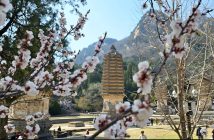
Recently, the World Health Organization officially classified air pollution as a carcinogen. This puts it in the same category as other cancer-causing agents like asbestos, plutonium, silica dust, UV radiation, and tobacco smoke. Fortunately change seems to be in the air, with new regulations supposedly taking effect in the near future. In the meantime, here’s what you can do to offset the harmful effects of air pollution.
Eating a variety of fruits and vegetables constitutes the foundation of cancer prevention. The more colorful, the better. A single apple contains thousands of antioxidants. Try carrots, sweet potatoes, beets, leafy greens like Chinese broccoli or jièlán (芥蓝), pineapples, papayas, grapes, or Chinese bayberries or yángméi (杨梅) – the list is endless.
When we breathe in the free radicals that float around in polluted air, they cause damage to our lungs, hearts, and other internal organs. Studies show that supplementing with antioxidants like vitamin C, vitamin E, and selenium can help “deactivate” free radicals. The antioxidant N-acetyl-cysteine (NAC) is particularly beneficial to the lungs. Consult a nutrition expert for specific dosages and recommendations.
Some naysayers argue that air purifiers do not make a difference because unclean air can still leak into the home. That is true, but even if the air purifier reduces airborne pollutants in your home by only 20 percent, isn’t that better than nothing?
The benefits of plants cannot be underestimated. NASA studied the effectiveness of plants to sustain life in a confined environment and purify the air of harmful chemicals like formaldehyde. The agency’s experiments used six to eight large plants per person. You may not be able to fit that many in your home but, again, aren’t a few plants better than none?
Check AQI levels and plan accordingly. One of the most reliable sources for AQI readings, especially if you live in the Liangmaqiao area, is iphone.bjair.info. Levels can vary dramatically throughout the day, so check often. Avoid outdoor activities when readings are high (my cutoff point is 230-250 AQI). If you must be outside, wear a mask and use a model like the N95 that can remove 95 percent of pollutants.
Our body has a way of naturally removing toxins from our system. This process is known as detoxification. There is not enough space in this column to get into the “how,” but readers should speak to a health professional if they would like to find out more about detoxification.
Got a question?
Melissa Rodriguez is a mom of two and a wellness consultant. She also works as a naturopath at International Medical Center. Check out her website at www.drmelissarodriguez.com
Photo Courtesy of Jorge Royan (Wikimedia Commons)
This article originally appeared on p28 of the beijingkids December 2013 issue.
Check out the PDF version online at Issuu.com


